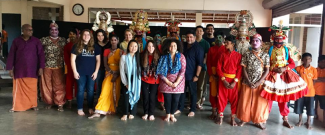
Last month the South Asia Center kicked off the travel component of C.U. in India: Performing Arts in Modern South India led by Dr. Davesh Soneji. In Chennai we were fortunate to have a visit from S. Asia Studies Department Chair, Dr. Deven Patel, before departing on the first leg of the trip the following morning. After arriving in Kanchipuram (Punjarasantankal village) for a day-long workshop with Kattaikkuttu Sangam, students learned about the work of the organization which strives to reinvigorate this traditional theater form. At the workshop, students watched an abridged version of Dice and Disrobing (Pakatai Tukil), from the Hindu epic the Mahabharata, and had a glimpse of the behind the scenes making of these 10+ hour productions of song, dance and dialogue.
It was a spectacular performance and our students loved the chance to meet youth actors and musicians of the sangam.
On the third day of the C.U. In India: Performing Arts in Modern South India trip the group traveled to Pondicherry for an intimate and rare music lecture and workshop with Dr. B.M. Sundaram and Vaduvur Krishnamurthi at Indianostrum Theatre. The students were blown away by the virtuosic playing of nagasvaram musician Vaduvur Krishnamurthi and felt grateful for the opportunity to dialogue with the well known and respected musicologist Dr. B.M. Sundaram.
During our road trip from Pondicherry to Thanjavur, on the fourth day of the C.U. in India: Performing Arts in Modern South India trip, the group stopped by a village goddess temple where they learned about daily ritual practices in rural Tamil Nadu. After a restful evening the students started the fifth day of the trip with a tour of UNESCO World Heritage Site, Brhadisvara Temple, which played an integral role in devadasi communities living in the region. Students were granted special access to view rare Maratha portraits within the temple grounds dipicting devadasi dancers and Maratha rulers known for patronizing performing arts in the region. Afterwards students traveled to Thiruvaiyaru, a panchayat town about 13 km from Thanjavur. There students visited the seraglio of King Serfoji that sits on the banks of the Kaveri river, the shrine dedicated to the composer Tyagaraja built by famed devadasi Bangalore Nagaratnam and the adjacent shrine memorializing her life. The students ended this jam packed day with an intimate visit with a nattuvanar from the area who has has come from a traditional devadasi community and has sustained the tradition of music and dance in his family.
On the sixth day of the C.U. in India: Performing Arts in South Asia trip, the students visited the Thanjavur Palace where they learned more about the influence of Maratha rule on devadasi culture and viewed it's significant bronze idol collection. Afterwards students drove to Swamimalai to see a private bronze pour demo. There they learned more about the economic and social implications of bronze idol consumerism, how it relates to the Indian diaspora and the export of Indian culture to the world
After a long travel day to Hyderabad students from the C.U in India course participated in the trip's flagship event, "Performance and Conversation on the Hereditary Community of Women Artists". This event examined the unique history and culture of the Kalavanthulu community in Andhra Pradesh and how they are connected to broader discourses related to Devadasis in South India. Students were fortunate to hear singing from Kalavanthulu community members Smt. Annabattula Lakshmi Mangatayaru and Smt. Annabattul Sai Leela and percussion by Sri Yendamuri Subba Rao. Dr. Yashoda and her dance students provided a beautiful performance of Kalavanthulu dance repertoire. The performance was guided by a lecture from Dr. Davesh Soneji who detailed the historical and contemporary significance of the works displayed. The event concluded with a passionate conversation between artists and audience members, demonstrating the often contested and volatile nature of social attitudes towards Devadasi populations in India today. Before leaving Hyderabad students toured the Salar Jung Museum and Old City.
On the tenth day of the C.U in India: Performing Arts in Modern South India trip, the group participated in a music workshop by Subhiksha Rangarajan at Wondering Artists in Chennai. Subhiksha taught students about the fundamentals of Carnatic singing and gave us a demo of some standards. That night students celebrated New Year’s Eve at a masquerade party in Savera Hotel. The trip concluded with a walking tour of Kalakshetra, the famed performing arts school that claims to be the birth place of modern Bharatanatyam and Madras Theosophical Society, where Rukmini Devi Arundale the founder of Kalakshetra, was intimately associated.
The guest speakers, participants and organizers of this program provided students with a warm and educational experience, and they all had a fantastic time diving deep into the world of performing arts in South India. We would also like to thank Penn Global Seminars for sponsoring this trip
To see more photos from the C.U. in India: Performing Arts in Modern South India
